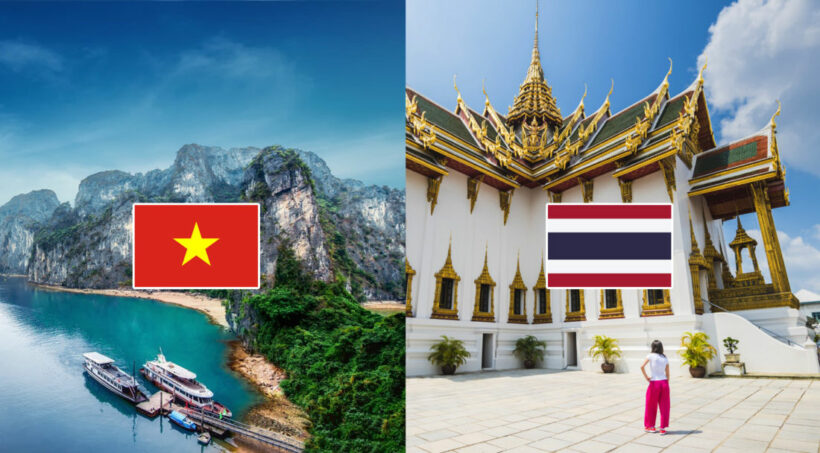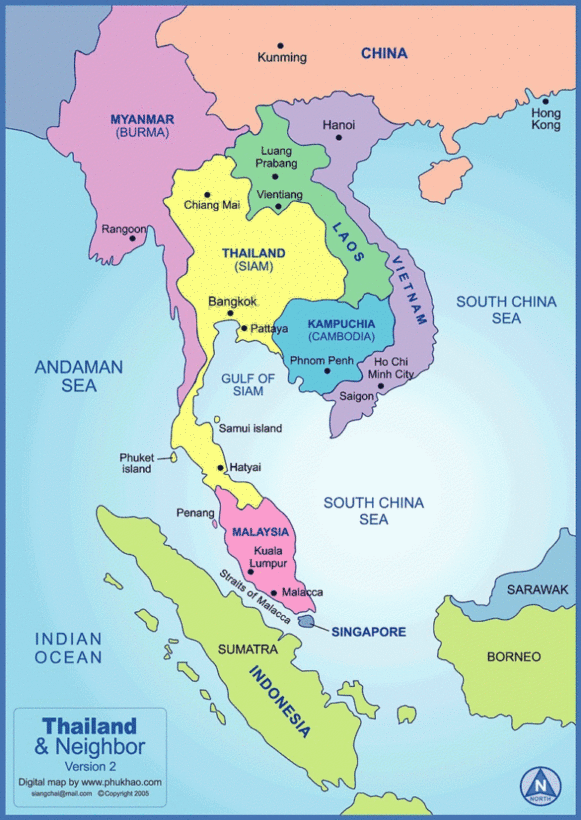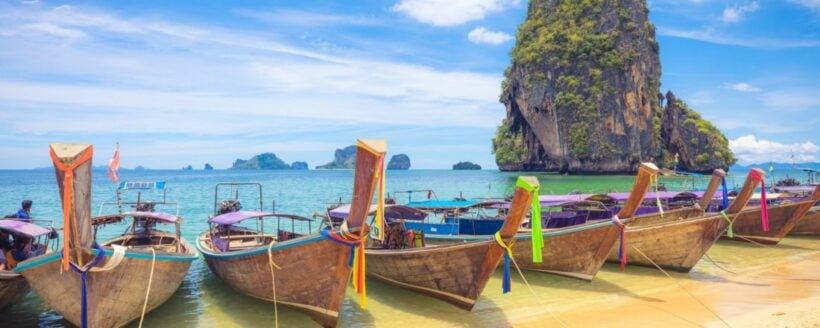Vietnam versus Thailand – which is the best for travel or living?

They are both beautiful countries and stand out amongst their south east asian counterparts for their food, culture and scenery. But which one is your choice for travelling or living in? Here are some introductory thoughts…
Influences
Thailand is a constitutional monarchy and the former king, King Bhumibol, was greatly loved and respected. His son, King Maha Vachiralongkorn, now maintains the customs and traditions of the Thai monarchy. His coronation was an elaborate ceremony in May 2019 celebrated by all Thais.
The main religion in Thailand is Theravada Buddhism. Monks retain high status and are a big part of daily life, from festivals to daily blessings. Young Thai men become novice monks for a period – usually 1-3 weeks – to earn “merit” for their families.
Thailand is a hodge podge of old culture and traditions fused with modern western influences – often at the same time. Thais celebrate everything and are reasonably tolerant to all cultures. Thai people always try and make their work and daily life ‘fun’ (or sanook) and have a huge passion for food. Thais never eat alone.
On the other hand Vietnam has a more defined cultural contrast than Thailand and can be a bit more opaque to western travellers. Unlike Thailand that has not had any major colonial influences, Vietnam has been hammered with three key impacts to its recent history – China, France and the US, in the form of the Indochina War, known in the west as the Vietnam War.
Centuries of Chinese occupation has had a profound historical legacy on Vietnamese thinking and customs. This heavily influences their customs, traditions and beliefs. The legacy of French colonialism, which lasted six decades from the 1880s, has mostly influenced distinctive French architecture and food.
To that end, Vietnam has maintained a more authentic local culture whilst Thai culture has been more flexible to accommodate the large influx of tourists and investment. Vietnam will certainly have more cultural surprises which many travellers will find more interesting. But that also makes travelling, and living in Vietnam, more challenging.
There is also lingering suspicion of the west, particularly Americans and particularly in the north of Vietnam, but only with the over-50 generation whose memories are more shaped by the horrors of the 20 year conflict that finished in 1975, leaving the country divided and battered by war.
But a walk around Hanoi, to the north, and Ho Chi Minh City in the south, will expose modern, bustling Asian metropolises with designer clothes, skyscrapers, and tremendous growth, enthusiasm and smiles.
Vietnam is run by a one-party communist government. Thailand has a quasi-democratic system of government with the Thai King as a head of state. In both countries the military has a strong presence in politics.
Both are ‘stable’ and considered safe for travelling and living, in terms of daily life.

Getting around
Thailand wins hands down with convenience, options and comfort. Travelling around Vietnam, although progressing quickly, is still more of an adventure.
In Vietnam, air transport is excellent and opening up fast, but the country’s road and rail transport infrastructure is still a ‘challenge’. If you’re travelling to Vietnam you may find it more convenient to take organised tours at this stage as the FITs (free and independent travellers) will certainly need more patience than they would in Thailand.
Motorcycles are ubiquitous in both countries. In both countries the driving habits may appear chaotic (and dangerous) to outsiders but the chaos on Vietnam’s roads is slightly better organised. In both cases there’s a lot of ‘local knowledge’ you will only ever learn by experiencing life in the fast lane. NOT for beginners.
Thailand is already highly developed in tourism with airlines serving both international and domestic routes. You are spoiled by choice. There’s plenty of local transportation, not necessarily cheap anymore, with options in the cities from tuk tuks, taxis and motorcycles. Bangkok has a modern mass transport system that now links most of the city’s main locations. There’s also thousands of tour companies and options for just about any sort of holiday. It’s one of the world’s most popular tourist destinations for good reason.
In comparison, there are not that many international flights from western countries to Vietnam, but the situation is changing fairly quickly.
Thailand is served by far more airlines, from all over the world. Thailand also has much better domestic travel facilities and services than Vietnam.
Domestic flights in Vietnam are very convenient, and there are many flights between the main cities. But domestic buses and trains are ‘basic’ in Vietnam, compared to Thailand which has more comfortable options.
Visas
You can’t just land in Vietnam and get a visa on arrival. It doesn’t exist except for ASEAN countries (for less than 30 days), and a handful of other countries for 15 days only (situation changes and updates so ask Mr Google before you book your flight).
There are three ways of obtaining a visa for Vietnam – via a Vietnamese Embassy or Consulate, an E-Visa, or a Visa on Arrival (which requires a sponsor letter and pre-approval). The E-visa is a pilot electronic visa system launched in 2017 – visitors can apply for a 1 month single-entry visa by paying US$25 via the official immigration platform.
Business visas are a little trickier. Applicants need to get an official entry clearance from their sponsor, usually their employer. This visa allows for multiple entries and lasts for up to one year. If you plan to apply for a business visa, you have to obtain approval from the Vietnamese Immigration Department through your sponsor. If you do not have a business partner, employer, or other sponsor who can provide you with an entry clearance, you can also apply for a business visa for a stay of up to 90 days.
Diplomatic and official visas can be applied for without having to pay any visa fee.
For long-termers you better consult your local embassy because the situation changes fairly often. Suffice to say, you can’t just come and stay in Vietnam without a lot of paperwork and occasional frustration.
There is a Permanent Resident Card but its qualifications are fairly stringent and would require the assistance of a proper immigration lawyer or agent.
Thailand is much more convenient with respect to visas. Passport holders from 57 countries, including the citizens of most European countries, Australia and the US, can enter Thailand for up to 30 days without having to apply for a visa beforehand.
For long-termers there are a number of categories, including business visas, ‘retirement’ visas, smart visas and a few other categories. All require application and plenty of paperwork.
Recently the Thai government has cracked down on the enforcement of qualification for many visas which is causing problems for some long-termers that have ‘fallen through the cracks’ in the past but are now finding visa extensions a bit more difficult.

Language
English is much more commonly used in Thailand, especially in any of the popular tourist spots, and is a compulsory subject in Thai schools. But out of the tourist zones any English spoken is ‘basic’ at best.
Outside the two cities or tourist spots in Vietnam, you’ll be battling with English or any other foreign language.
Affordability
Both countries should still be considered ‘developing’ with a relatively low cost of living and labour costs. A holiday in either country is still affordable and good-value, especially if you know where to stay and are happy to ‘eat with the locals’. Both offer excellent accommodation options, dining and tours at a wide spectrum of prices – from backpackers to high-end luxury.
Generally, Thailand has a more developed sense of the various options, booking systems and branding to identify the differences in accomodations, comparable to the west. Vietnam has plenty of options too, but you have to dig a bit deeper to find the information and will have a few more surprises along the way.
Daily costs, especially food and accommodation, at the local level in Vietnam, is certainly cheaper at this stage although catching up fast as inflation is very high.

Food
Thai cuisine is better known than Vietnamese cuisine. Anywhere in the world you’re going to find more Thai restaurants and the flavours and dishes of Thailand are easier to define and describe that their Vietnamese counterparts.
But Vietnamese cuisine has its own features and is becoming more popular. It can also be spicy and pungent, with plenty of fresh herbs, although generally less spicy than Thai food. But you’ll be able to dine cheaper in Vietnam than in Thailand, whether in the capitals or on the streets in the countryside.
Vietnamese food also has a French influence with a developed coffee culture and excellent bakeries.
Currency
In Vietnam you can use Dong or the USD. It’s always best to carry some Dong for local purchases. Local shop owners or taxi drivers will probably accept your USD but will have their own ‘commission’ added to the exchange. Currency exchange is easy in most parts of Vietnam, certainly in the cities.
In Thailand it’s the ‘baht’ or nothing. Your USD will be of no use on the streets and you’ll need to get it changed into the local currency.
There are exchange booths everywhere in tourist hot spots and ATMs will dispense you local baht but be careful of the exchange rates and fees when doing international currency exchanges via an ATM.
Medical care
Thailand has a much better developed medical and health care system than Vietnam at this stage. Relative to western countries, the standards of the hospitals are very high and the medical costs still reasonable although private hospitals have become noticeably more expensive over the last decade.
Vietnam is still decades behind Thailand in this respect although catching up fast.
Scenery
This is difficult to judge as both have stunning scenery and plenty of diversity. Thailand’s beaches are definitely better but Vietnam’s landscapes are stunning and wins hands down. Vietnam does have some good beaches, but they are not as attractive or plentiful as Thailand.
Touring around Vietnam is certainly cheaper at this stage but less organised and developed, with fewer options.
Thailand is more geared up for tourists and has more variety but for sheer adventure, Vietnam is hard to beat.

Seasons
Thailand generally has a hot season, which usually lasts from March/April to June/July. That turns into the hot and wet season that continues until November as the southwest monsoon swings into action sweeping in moist air from the Indian Ocean. The ‘cool season’ running from December to March, is drier and more comfortable – in the north getting quite cold on some days, in the south drier but never dropping below 20 degrees.
Vietnam has a more diverse climate. The south is divided between wet and dry seasons, which is similar to Thailand. Da Lat and the Central Highlands have their dry season from December to March until the southwest monsoon season. The central lowlands, such as Nha Trang, are protected by the mountains and enjoy a long dry season from January to October.
North Vietnam has a distinct winter and summer, completely different to much of Southeast Asia. The winter, from November to March, is wet and cool. The summer, from May to October, is hot with the occasional typhoon swimming in from the South China Sea.
Scams and annoyances
Both have their fair share.
Vietnam Visa scams – Certain websites offer online visas in exchange for a fee. Vietnamese embassies have issued a message to warn travellers that those websites are not official, and that they often fail to issue visas. Also, certain travellers thought they were covered by these websites, but once at the airport in Vietnam, the authorities refused them the entry, and they had to go back to their country of origin.
Cheating in the shops can be one of the most annoying problems for travellers to Vietnam. Shops may attract customers by advertising lower prices, but the price may increase at any time and you may end up pulling out more money than what was originally asked for. Continue to read Vietnam Tourist Traps and Scams.
In addition, cheating may even happen as you change money. Since the denominations of dong are very large, sometimes travellers may be confused by the trail of 00000s.
Cheating and scams also happen in Thailand, especially tourist locations. Some restaurants have two menus, one for locals and the other with higher prices for foreigners. The same applies at some tourist attractions although the two-tier pricing in this case is bracingly rubbed in your face. Beware of taxi and tuk tuk drivers that offer to take you to a ‘cheap’ gem shop, a massage shop or a tailor, or know a ‘friend’ with a cheap hotel. It will end up an expensive ride.
The prices in those shops will certainly shock you, for they will be two or three times higher than the normal prices.
The bar scene in Thailand’s tourist hot spots with its ‘girlie bars’ will delight you with pumping music and tight hot-pants but, as the song ‘One Night in Bangkok’ says “The bars are temples but the pearls ain’t free”. The sex scene in Thailand is, at the same time, strictly illegal, and also in-your-face. The drinks are expensive and the after-drink entertainment might cost a lot, lot more.
Latest Thailand News
Follow The Thaiger on Google News:


























